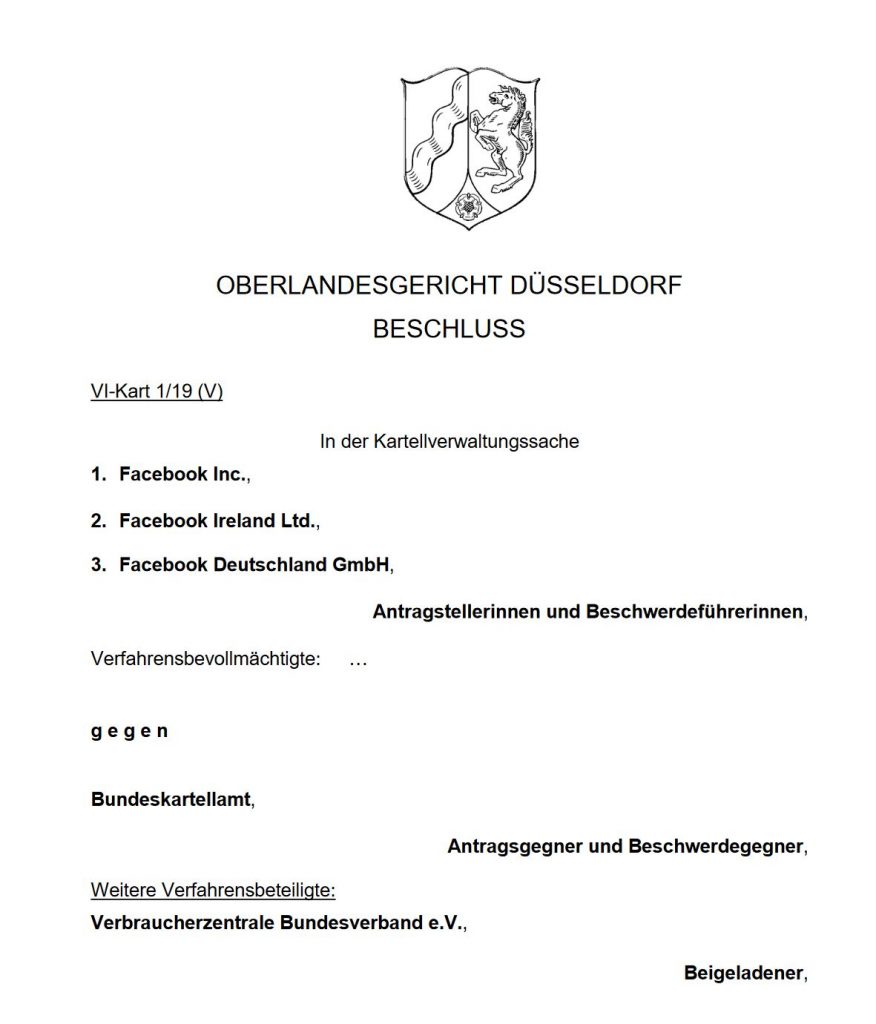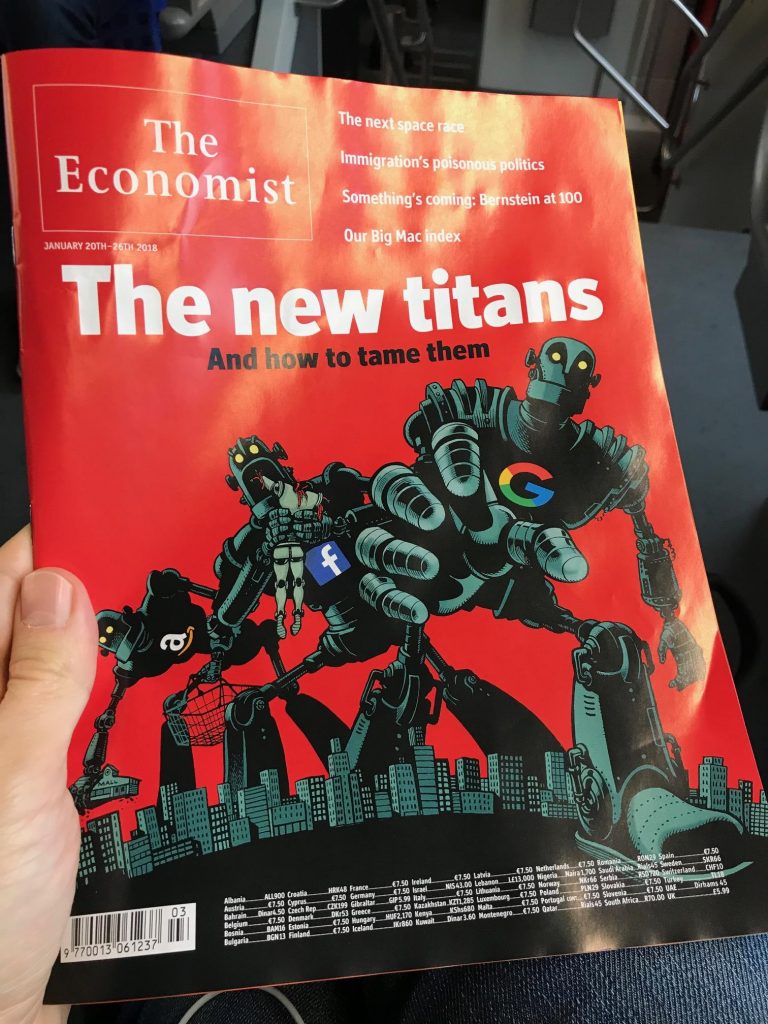
Facebook vs. Bundeskartellamt
The Düsseldorf Higher Regional Court has decided the Facebook case in interim proceedings. This did not turn out well for the Bundeskartellamt, and high-flying hopes that digital markets can be regulated with courageous antitrust decisions have thus been dampened. Here are some thoughts by Rupprecht Podszun.
Bitter. That was the word that first came to my mind when I learned about the decision of the Oberlandesgericht (OLG) Düsseldorf regarding Facebook. Bitter for the people at the Bundeskartellamt, the Federal Cartel Office, which had taken some effort (three years) and had presented its Facebook decision internationally with a lot of verve. Some of my colleagues, who are not fluent in German, asked me what had happened, since there is no English-language press release or even a translation of the 37 pages. You can find the decision in German here: http://www.olg-duesseldorf.nrw.de/behoerde/presse/Presse_aktuell/20190826_PM_Facebook/20190826-Beschluss-VI-Kart-1-19-V.pdf
I’ll tell you later about the decision in English.
So, what happened?
The answer is a simple one: Our beautiful antitrust decisions on the digital world must pass the test of the courts. And the Facebook decision did not pass this test in the first instance, in summary proceedings at the Düsseldorf Higher Regional Court. The FCO virtually drove Facebook into these (unusual) summary proceedings by putting down in the decision that it would only wait with the enforcement (and thus “keep still”, as it is called) for the time necessary to appeal to the first instance in interim proceedings. Often, such issues are dealt with on a more informal basis, but here, things were pressing.
These proceedings are sometimes called “fast track”, they deal with Section 65 of the German competition act. The applicant (Facebook) applies for suspensive effect of its application. “Fast track” is a relative word, however. The OLG took several months before coming up with a decision. But we know that such courts have a lot to do after the Federal Supreme Court annulled a decision in a fining case for too late submission of the judgment (Rossmann).

Here, it was the 1st Cartel Senate with Judge Kühnen presiding. He and his Judges Lingrün and Lohse are well known for clear, unambiguous words. And this also applies to the decision on Facebook. A newspaper had formulated that the decision of the FCO had been “picked to pieces”. In the interim proceedings, I would have rather expected the Senate to keep the decision more open, along the lines: “These are all difficult legal questions and at the moment we are not convinced”. No, that’s not how it happened. In the decision, you find sentences like this one:
“Apart from the fact that that point of view misses the resolutions of the contested decision (…) the reasoning on the merits is without substance and meaningless.”
Incoherent. Without substance. Meaningless. I said, it is bitter for the FCO.
Like or dislike?
What do we make of that court decision now? For non-lawyers (m/f/d) it seems downright inconceivable that an authority comes to a conclusion, a court to the opposite one, and that the legal observer looks at both and says: Hard to tell, maybe they are both correct.
Laws and precedents can be read differently. Finding the law is a discoursive exercise, dear friends, and this lives on everyone being willing to learn. I defended the decision of the FCO of February, and I still consider it a pioneering decision worth to be defended. But what the Düsseldorf court puts forward, has its merits, too: You may certainly interpret the jurisprudence of the Federal Supreme Court (BGH) in VBL Gegenwert and Pechstein in a different way than the FCO suggests. You can argue about the causality requirements in the context of abuse. One may legitimately question the remedies in this case and whether they fit the issues identified as problematic. And of course, the crucial question of this procedure is whether there is an anti-competitive effect stemming from a privacy law violation.
Perhaps, the FCO would have done itself a favour if it had gone much further and if it had brought up the courage to say: Yes, we are trying a novel theory of harm here! This is antitrust law for the digital age! And we are now seriously trying to take exploitative abuses to the spotlight after decades of ignorance!
Maybe this would have impressed the Higher Regional Court more than the attempt to interpret some difficult BGH decisions such as VBL Gegenwert as a model approach for competition in digital markets. You may notice, dear readers, my reluctance to lash out at either the FCO or the Court. And I already feel your disappointment while writing that there is no spectacular carnage here. Others can do that faster and better than me (please turn to Twitter for this).
The discovery of “damage to competition”
The decision of the OLG is a legal opinion through and through. Economic evidence, data economics do not play a role. The term “wettbewerbsschädlich” (“damaging competition”) should not conceal this. If the OLG operates with this term, it is not to be understood as a recognition of an EU-style “effects based approach”. The concept of “damaging competition” plays a central role in this decision, it is something which is not established as a term as such in German law. Yet, the Court points out that “the verdict of abuse of dominance presupposes a damage to competition”. “Damage to competition”, however, is a normatively charged term:
“An exploitation of the users of the Facebook network damaging competition through the conditions concerning the collection, combining and further processing of the additional data does not follow from the data protection infringement assumed by the Office. The use of contractual conditions that are inadmissible according to legal rules does not in itself indicate a threat to the protected goods of the Cartel Act (freedom of competition on the merits and openness of market access)”.
Please note: Abuse requires a damage to competition, this requires a threat to protected goods of the Cartel Act, these protected goods are the freedom of competition on the merits and the openness of market access. Competition on the merits, “Leistungswettbewerb” in German, is a key concept of the social market economy introduced by Hans Carl Nipperdey into German law in 1930 and popularised by Franz Böhm in high-times of ordoliberalism. Oh, they still exist these good ole things!
One note on institutions
We witness an institutional clash here: The Office, an authority where lawyers and economists work together, heavily involved in an international discourse, steered with a certain policy-drive, meets a trio of experienced judges who strictly apply the law. This is unkown waters and different institutions take the challenge in different ways. If you start an exploitative explorative tour here to the land of data protection, it is hard to tell in advance whether a court is willing to follow even if you are cheered on by a crowd of by-standers.

What next?
Andreas Mundt, the Bundeskartellamt’s president, has already announced in a tweet that the Office will appeal to the Federal Supreme Court, the Bundesgerichtshof (BGH). On the one hand I would be very surprised, if the FCO was confirmed there, since the BGH stressed several times that in such procedures it only undertakes “a plausibility test” of the OLG decision. In the case Sulzer/Kelmix, for example, the BGH stated (para. 10):
“Decisions of the Higher Regional Court pursuant to Section 65 (3) ARC can only be reviewed to a limited extent in appeal proceedings. The procedure under Section 65 (3) ARC is a fast track procedure in which, unlike in the regular appeal procedure under Section 63 ARC, there is no comprehensive review of the legality of the contested decision of the cartel authority. Pursuant to Section 65 (3) No. 2 ARC, the criterion for the review of the legality of the contested decision by the Higher Regional Court is whether there are “serious doubts as to the legality of the contested decision”. The Federal Supreme Court shall examine the result found by the Higher Regional Court only for legal plausibility.”
If the BGH really limits itself to that, I would say: the OLG reasoning sounds plausible, sort of.
On the other hand, I wouldn’t be surprised if the BGH came to a different conclusion than the OLG, either, since overturning the Düsseldorf court seems to have become a sport at the Cartel Senate of the BGH.
According to the press release on the decision, the Higher Regional Court has not scheduled main proceedings yet, so it will wait for the interim decision by the BGH. Then, the OLG will decide in the main proceedings. A lot would have to happen if the OLG were to abandon its current position in the main action. Thereafter, it would again be the turn of the BGH in the main action on appeal. In addition, OLG or BGH could ask the European Court of Justice for a preliminary ruling. That may be a game changer. The FCO had not looked into Art. 102 TFEU for whatever reason, yet this does not hinder the courts to turn to EU law. Enforcement of the decision may take a while.
Dum-di-dum
Such an implementation, if it ever comes, comes too late. We have been waiting for action ever since the FCO opened proceedings in 2016. Facebook, in the meantime, has announced that it will technically integrate the infrastructure of its three services Facebook, Whatsapp and Instagram. When that happens, we’ll have scrambled eggs. You will never get three separate eggs from that again. And, obviously, if you follow the Bundeskartellamt, monopolisation goes on.
In short, it takes too long! Google Shopping has already dragged on for 7 years with the Commission and is now hanging in the mills of the ECJ. Facebook is “only” in its fourth year – with no end in sight. Either we proudly acknowledge the slowness of the law (which also has its very positive side), or we seriously speed up things. A legally binding decision for digital markets after 10 years is nothing but a historical curiosity. I doubt that this still falls into effective enforcement of the law.
Substantive changes
Something can also be done on substance. The timing is just about right. Should people in Berlin like to see the tech-titans tamed (and in principle all politicians in Germany agree on this) and should they be disappointed by the outcome of the OLG proceedings, the 10th amendment of the German competition act offers a welcome opportunity to quickly readjust. This amendment is currently prepared by the government, as avid readers of this blog know.
The GWB is the right place to regulate: our main concern is competition, and here we are dealing with companies that have become gatekeepers for numerous industries. The GWB has always fulfilled important tasks for the media world, which is affected here, even if this is different media from the good old local newspapers, which are so perfectly subjected to the application of German competition law.

Now Berlin can show courage and even (hello, champions of national championism!) do something for German enterprises, which become dependent in their economic development on the operators of the digital ecological systems.
Anyone who thinks that consumers also have a right to economic self-determination should power up the data protection authorities in Germany and introduce some powers for the Bundeskartellamt in the field of unfair commercial practices.
Is there any history to this?
It is a well-known wisdom among antitrust law experts that it is difficult to get done with abuse control what was missed in merger control. If the Commission had not lighthandedly cleared the path for Facebook/WhatsApp, this case might never have come to light. So, no schadenfreude in Brussels, please.
And now, in English please!
I had promised vaguely said to a number of foreign colleagues that we could publish an English version of the decision in the blog. We then ran the 37 pages of the decision through a translation software. When I read it I laughed thought: Awesome! All this software and artificial intelligence and Facebooky-dooky-ism is still so far away from perfection – you were simply not able to understand what came out of that machine. Maybe in Silicon Valley they are much better in marketing than in data analysis (if these data are German court decisions).
We started editing the translation but at some point our capacities were exhausted. Translating a German court case into English is as nerve-wracking as having to explain to a 15-year-old kid that he/she shouldn’t be constantly on Instagram. And so we proudly present the result of our endeavours: An unintelligible German court case:
Sorry, guys!
One final song for the weekend! Have a nice one!
12 thoughts on “Facebook vs. Bundeskartellamt”
Der Dienst deepl übersetzt für gewöhnlich ganz gut vom deutschen ins englische.
Danke für die nuancierte Einschätzung! Das Problem mit der Übersetzung hatte ich auch – hier deswegen nur eine stark verkürzte Zusammenfassung (also eigentlich Lesenotizen) auf Englisch: https://docs.zoho.com/file/g8kn5705008f2d13943ae9e3ecdb69521d1c2 Disclaimer, ich bin keine Juristin, sondern Ökonomin.
Thanks for sharing, Aline! – RP
Faschinating blog article. Thank you so much. I am reading the decision in German so I can brief colleagues on it. (I am a competition lawyer at another tech business.)
I don’t often read German case reports so I can’t tell how much the style and level fo detial departs form the norm but this one sure is hard hitting. Nothing is left untouched. The court even attacked the BKA’s reasoning on the loss of control which surprised me.
I have to say I agree with what I have read so far. I wasn’t convinced when I read the BKA’s decision last month and didn’t find the causality arguments at all compelling (although as a UK lawyer I don’t know Pechstein and VBL). The BKA also failed to show the effect on competition with third parties in any detail. All in all – I think the harsh ruling is deserved – the BKA did something brave but dropped the ball with what was clearly going to be the most important part of their decision. It’s almost as if they didn’think they had to do it.
I’m more ambivalent on market definition – I thought the BKA was overly narrow but it was always obvious Facebook is dominant on some sort of social media market.
P.S. I love it when I can combine my first degree (languages) with my legal one and thus prove I didn’t waste all those years as an undergrad.
Dieses Urteil hat viele hochspannende Facetten. Rechtlich sehr interessant finde ich die Positionierung des Senats zur Missbrauch marktbeherrschender Stellung gegenüber Endverbrauchern. Die grundlegende Frage dürfte sein: Erfassen Art. 102 AEUV und § 19 GWB sämtliches Marktverhalten eines marktbeherrschenden Unternehmens gegenüber Endverbrauchern, das diesem Unternehmen erst aufgrund seiner marktbeherrschenden Stellung möglich wird? Das OLG Düsseldorf sagt nein. Es fordert einschränkend eine wettbewerbsschädliche Verhaltensweise des marktbeherrschenden Unternehmens.
Aber der Endverbraucher hat im Wettbewerb eine andere Funktion als die anderen Marktteilnehmer. Natürlich steht er als Nachfrager im Wettbewerb zu anderen Endverbrauchern. Aber er hat nicht mehr die Aufgabe, Wert zu schöpfen; er darf als letzte Marktstufe von der Wertschöpfung der anderen Marktstufen profitieren. Denn die Marktwirtschaft dient dem Menschen.
Daher darf man fragen, welcher Wettbewerb denn nach Meinung des OLG Düsseldorf geschädigt werden müsste. Der Wettbewerb unter den Endverbrauchern als Nachfrager? Das halte ich aus den vorgenannten Gründen für fraglich. Ziel des Kartellrechts ist wohl weniger, den Wettbewerb unter Endverbrauchern zu fördern, als die Endverbraucher vom Wettbewerb profitieren zu lassen.
Oder muss der Wettbewerb unter den Anbietern geschädigt werden? Dann wäre der Schutz des Endverbrauchers (als Nachfrager) durch Art. 102 AEUV und § 19 GWB nur noch Reflex des Wettbewerbsschutzes auf Anbieterseite. Damit wären diesen Normen Art. 101 AEUV und § 1 GWB angenähert. Das kann man (als ordoliberal denkender Kartellrechtler) für richtig halten oder (als verbraucherschützender Kartellrechtler) für falsch. Jedenfalls rührt dieser Punkt an grundlegende Fragen.
Ich meine, der BGH hat in den vom OLG Düsseldorf angeführten Fällen diese Endverbraucher-Konstellation nicht entschieden (siehe z.B. Rn. 57 in VBL-Gegenwert I; Frau Pechstein ist in gewissem Sinne wohl auch Unternehmerin). Aber es wird sehr spannend, wie sich der BGH zu dieser Frage positionieren wird. Wenn er dem OLG Düsseldorf widerspricht und keine wettbewerbsschädliche Verhaltensweise fordert, würde er dem Bundeskartellamt weitreichende Befugnisse als Verbraucherschutzbehörde einräumen. Denn dann könnte das Bundeskartellamt jedes Marktverhalten eines marktbeherrschenden Unternehmens gegenüber Endverbrauchern kontrollieren, das dieses Unternehmen mit Hilfe seiner marktbeherrschenden Stellung durchsetzt.
Verbraucherschützer würden sich freuen, dass eine so starke Behörde wie das Bundeskartellamt diese Kompetenzen erhält. Liberale wird es davor grauen, dass die Exekutive per Generalklausel eine solche Prokura zur Marktsteuerung bekommt.
PS: Im Evangelium nach Lothar Matthäus heißt es doch “Wäre, wäre, Fahrradkette!”. 😉